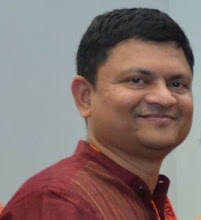This is the story of two teen-aged cousins. The first half is of the slightly older one (Nachiket) who is starting to ask himself some abstract questions about being as he sees around him relations that are not completely healthy, but are shown to be that way so that minds don't get hurt. He hopes to go away from all this. He is the idol of his younger cousin (Samir) who is visiting. Samir does not understand what Nachiket is talking about - and thinks Nachiket is going to run away, and shortly thereafter his own journey starts.
It is an extremely well made, well acted movie which deals with the unanswerable question of death and what it means and how it should be handled. Music, photography, repetitions (the well, swimming, dripping water, biking, bus rides) are used effectively to create an atmosphere that keeps you bound to the theme. The relations between the large family and their nuances are brought out very well and provide a nice skeleton to the story.
Somewhat philosophical in nature if you look at it the right way. Half way through it may seem to proceed rather slowly, but it is necessary to create the atmosphere, and it picks speed in the second half. Overall, no complaints. Well worth taking a dip in the vihir.
Vihir (2009) (8/10)
Sunday, April 25, 2010
Saturday, April 24, 2010
Dhyasparva (2001) (8/10)
A biographic film from the turn of the 19th-20th century extending to a little past India's independence. The character being portrayed is Raghunath Karve, the son of another illustrious person viz. Dhondo Karve. Obviously the society then was more under the yolk of misconceptions, both religious and social. The resistance that ra dho meets to his very well intentioned but equally direct and blunt approach is imaginable (though not understandable). After seeing the strange opposition that Dadasaheb Phalke met to his filmmaking it wasn't surprising to see the tempers rise when family planning was being advocated by ra dho when even remarrying by women was not allowed. What is worrisome is that the issues have changed, but the views, the opposition to other (now current) issues has not. The dogma continues, and it springs mainly from blindly believing what is ancient and what the masses say. In fact now it is worse in terms of groups physically attacking someone (rather than bahishkar which could sometimes be a boon) because they think (I should say feel since normally they don't think at all) does not agree with their views (which are really someone elses views - as for instance, Gandhi's followers not having read his book, and attackers of Bhandarkar institute not having read James Laine's book). It is also interesting how the politicians have not changed either. I mean even the earlier ones had some strange mindsets.
The exchanges between ra dho and Shakuntala Paranjpye, Mama Varerkar and Babasaheb Ambedkar added a good flavour to the movie.
Dhyasparva (2001) (8/10)
The exchanges between ra dho and Shakuntala Paranjpye, Mama Varerkar and Babasaheb Ambedkar added a good flavour to the movie.
Dhyasparva (2001) (8/10)
Subscribe to:
Posts (Atom)



